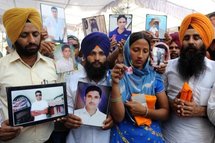
In Amritsar, relatives hold photographs of Indians sentenced to death for killing a Pakistani in the UAE.
Judge Yunis al-Reda of the Sharjah Court of Appeal decided to put off the hearing until June 16 after discovering that no interpreter was available to serve the defendants in the dock.
"There is a translator who could only translate in Hindi" while the defendants could only understand Punjabi, the head of India's Lawyers For Human Rights International, Navkiran Singh, told AFP after the hearing.
He said that the lack of translation could mean that the whole trial was wrong. "If they never understood what happened in court, then all the proceedings are null and void," he said.
The 17 were convicted of being the leaders of a mob of up to 50 people involved in the attack in which the Pakistani man was beaten to death with metal bars.
Singh reiterated LFHRI's claims that the defendants were tortured and forced to confess.
"They were tortured and they were forced to give confessions," he said, adding that they "were given electric shocks, beaten with plastic pipes and golf sticks... for 10 days."
"Some of those people have injuries on their bodies, which they've shown to me," he added.
A day after the death sentences were handed down, Minister for Overseas Indian Affairs Vayalar Ravi described them as "shocking".
"The death sentence to 17 people at a time is rather shocking so we have decided to give maximum possible help to them," Ravi told reporters.
But the human rights advocate accused the Indian authorities of doing too little to help their expatriate citizens.
"For 12 months, none of the consulate members ever met with these people," Singh said.
The Indian authorities "never did enough... They don't have offices open here just for the economics and diplomacy," he said.
Indian consul Anshul Sharma, who was present in court, declined to speak to reporters.
Death sentences are usually commuted to life in prison in Sharjah and the rest of the UAE.
-------------------------------------------------------------------------------------
"There is a translator who could only translate in Hindi" while the defendants could only understand Punjabi, the head of India's Lawyers For Human Rights International, Navkiran Singh, told AFP after the hearing.
He said that the lack of translation could mean that the whole trial was wrong. "If they never understood what happened in court, then all the proceedings are null and void," he said.
The 17 were convicted of being the leaders of a mob of up to 50 people involved in the attack in which the Pakistani man was beaten to death with metal bars.
Singh reiterated LFHRI's claims that the defendants were tortured and forced to confess.
"They were tortured and they were forced to give confessions," he said, adding that they "were given electric shocks, beaten with plastic pipes and golf sticks... for 10 days."
"Some of those people have injuries on their bodies, which they've shown to me," he added.
A day after the death sentences were handed down, Minister for Overseas Indian Affairs Vayalar Ravi described them as "shocking".
"The death sentence to 17 people at a time is rather shocking so we have decided to give maximum possible help to them," Ravi told reporters.
But the human rights advocate accused the Indian authorities of doing too little to help their expatriate citizens.
"For 12 months, none of the consulate members ever met with these people," Singh said.
The Indian authorities "never did enough... They don't have offices open here just for the economics and diplomacy," he said.
Indian consul Anshul Sharma, who was present in court, declined to speak to reporters.
Death sentences are usually commuted to life in prison in Sharjah and the rest of the UAE.
-------------------------------------------------------------------------------------









 Home
Home Politics
Politics









